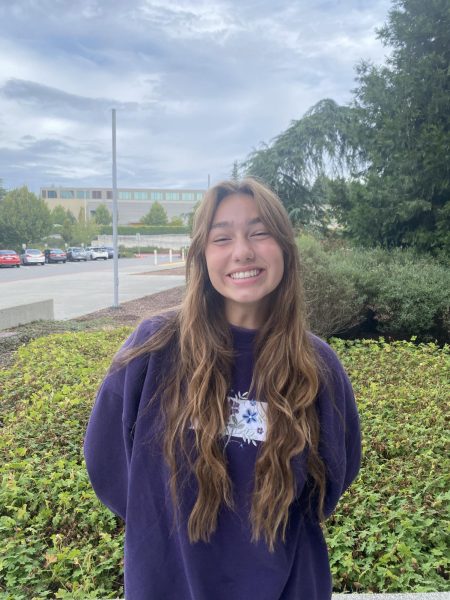Music Is Back in Its Natural State
April 1, 2022
An examination of what defines human life would find a thread of commonality in music. It follows us around supermarkets, it is in our ears as we tune out the pressures of each day, it fills our minds and moves our bodies. Music lays dormant until it is emerging from the instruments of its origin. Poetry and prose alike spill from the lips of artists we look up to. Concerts. Concert experiences are revered. Depending on the individual, concerts can be sacred. Places such as stadiums, theaters, arenas, and parks are transformed into rich and worthy venues. The beautiful cacophony of a vocal crowd mingling with a melodic performance. Everything feels exciting.
Touring and concerts have always been a major part of the music industry. Junior Ellie Roberts notes how “live music can make or break an artist’s career.” This idea reaches into the depths of music history. An article in the New York Times from 1977 praised Fleetwood Mac for a concert during their tour for the album “Rumours,” “In songs like ‘The Chain,’ from the new album, the band approached a fervent intensity that was almost scary. A fine 1970s rock band, and a fine concert.” It went on to recall how captivating the concert was, in comparison to the music played elsewhere: “Miss Nicks may look a little stagey in her seraphic posturing on stage, but it is compelling and endearing, too, and her singing is as agonized and throatily evocative as it is on records.” Sophomore Claire Schmidt comments on touring’s ability to enchant: “The theatrics of [Taylor Swift’s] 1989 [world tour] are unmatched.” Roberts agreed: “[My] first concert was Taylor Swift’s 1989 tour, and that was probably the best concert.” The importance of live music varies among fans. Schmidt says, “Live music is really important. The difference in the sound of the music in person compared to at home or with headphones is crazy. Emotionally, I create attachments to music artists, so it is about being in the same room as the person I am seeing.” The most vivid memories can come from these nights spent in the field of an amphitheater or on the floor of a performance hall, feeling the music seep through the ground. Roberts says, “I did go to a concert with a sprained ankle right before COVID started, and if I had not gone to that concert, I probably would not still have ankle issues, but I did, and it was worth it.” Underneath each merchandise table, by the smoke machines and lights, beyond the sea of seats, there is pure joy.
Schmidt told the story of a “lifechanging show” in February 2019: “Favorite concert I have ever been to was Kacey Musgraves: Golden Hour. By. Far. She came to Seattle, she was at the Paramount, only a week after winning four Grammys. We got tickets the day of. Going to that concert, I was like, ‘I have to go to more of these.’zzz Then a year later, no more concerts.” The pandemic affected all areas of life, including the music industry. COVID’s influence can be seen throughout music release patterns and cancellations. Schmidt notes, “There are steps in the music making process that we would not even think about that were just cut off.” The Lumineers, a beloved folk rock band, has consistently followed the tried-and-true cycle of putting out music, touring, repeat. After a cancelled tour in 2020, The Lumineers shared on their Twitter account, “We are SO excited to bring the BRIGHTSIDE World Tour to you this summer! Thank you to everyone who has held onto their tickets, we’re excited to finally come to your city!” The Lumineers are not alone in this movement towards normalcy. Roberts offers, “It is interesting, because so many people were not touring, and they were just broadcasting shows and stuff. But there are so many concerts going on in the past few weeks, it is like artists are catching up.” This “catching up” has resulted in an influx of tour dates. For example, Pheobe Bridgers announced her upcoming Reunion tour on March 7, and it has been selling out since then. Senior Gavin Soleibe summed up the return of concerts, saying, “The connection between musician and audience is something I had missed and am thrilled to be experiencing once more.”
COVID still has a hold on big events, such as concerts. A recent article in the Seattle Times says, “Many organizations are seeing increased attendance, but numbers are not what they used to be, and leaders also aren’t convinced the loss of the mask and vax mandates will have a large impact on turnout.” This is due to the reluctance everyone is currently facing after a period of necessary safety precautions in public spaces. Freshman Omar Abdelrahman says because of this he “has not attended any concerts during the pandemic.” However, some are optimistic. A New York Times article on mask guidelines says, “Most outdoor concerts are generally safe. If you’re standing on a lawn watching a show, there’s really no data to support that a mask does anything to protect you that Mother Nature’s not taking care of.”
Although COVID guidelines have been changed, expelled, and revisited, music fans have stayed loyal. Touring is back. Let the feral joy begin.


